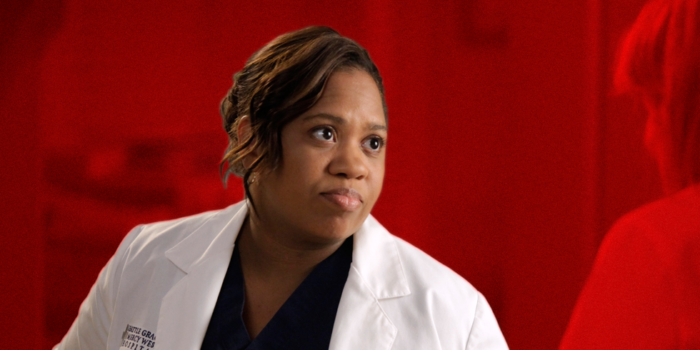2/1/18 By ELISABETH R. FINCH
Four years ago, when I began working on “Grey’s Anatomy,” Chandra Wilson directed my very first episode. Seventy-five percent of me was internally freaking out that THE Chandra Wilson/Dr. Miranda Bailey was directing my first episode of “Grey’s Anatomy” — but the remaining 25 percent of me was nauseous and weak and tired as hell. I was several months into what felt like my millionth round of chemotherapy for a rare form of bone cancer that had plagued most of my 30s — a cancer that went misdiagnosed for several years due to a doctor who refused to believe there was something wrong, despite my protestations otherwise.
At the same time, Chandra Wilson was not only acting and directing in “Grey’s Anatomy,” she was also a caregiver/advocate for her daughter who struggles with Cyclic Vomiting Syndrome — a chronic disease that also went undiagnosed for quite a while.
Throughout that episode, and in the years that followed, Chandra and I swapped “war stories” about ER visits, port-a-catheters, and difficult diagnoses. There was a shorthand — a knowledge of how hard it can often be, as women in particular, to be seen and heard when managing chronic illness.
When showrunner Krista Vernoff pitched the idea of Dr. Bailey having a heart attack this season, I was lucky enough to get to write that episode with some amazing help from my fellow “Grey’s” writers. I was lucky enough to have the opportunity to shine a light on how insidious and deadly — and frequently misdiagnosed — heart disease and heart attacks are in women, especially women of color.
And I was even luckier to sit down with Chandra Wilson after we shot the episode to discuss our personal experiences — and how crucial it is for people (women especially) to listen to their bodies and advocate, advocate, advocate for their own health care.
Elisabeth Finch: What was your reaction when we told you that Dr. Bailey was going to have a heart attack?
Chandra Wilson: I was excited. I was with you 100 percent when you were talking about how we would use Bailey’s past, how we would use flashbacks. The information that we would be getting out there about women and heart disease, and how it differentiates itself from men. And coupled with the fact that she was mad at Ben, and that she was going to do this journey on her own, and that the words were going to come out without me having fallen on the floor, gripping onto my chest, which is what you usually think about a heart attack. All of that I thought was just great stuff for an actor to get to do.
EF: I remember we connected about Bailey’s history with mental illness and how necessary it felt to bring that up, especially when she’s trying to convince people that she’s physically not well.
CW: It’s something that is really important to me as an actor and someone who has that story to keep that story alive. She’s got her meds now, she’s theoretically level or good for her baseline, but it’s not gone. It’s something that she still has to work with and be aware of. The fact that it gets to come up as a part of this story, again, that’s something that I love.
EF: Right. We were able to imbue this character with this history, and also educate people about what heart disease looks like in women. I remember doing a lot of research about how many things can take a woman off-path of getting the care she needs, particularly [for] heart attacks, [because] of the presumption that it’s something anxiety based, emotionally based, or because it doesn’t look like a stereotype.
CW: One of the resonating things that Bailey says in the episode is about the instance where a woman walks into an emergency room with physical symptoms, but then she’s treated based on her emotions. That’s a journey in health care. How do you advocate for yourself, especially when you’re in pain? There are countless people that deal with that, and you and I have talked about that in our own health care journeys — your own personal one, mine with my daughter.
READ MORE AT SHONDALAND

